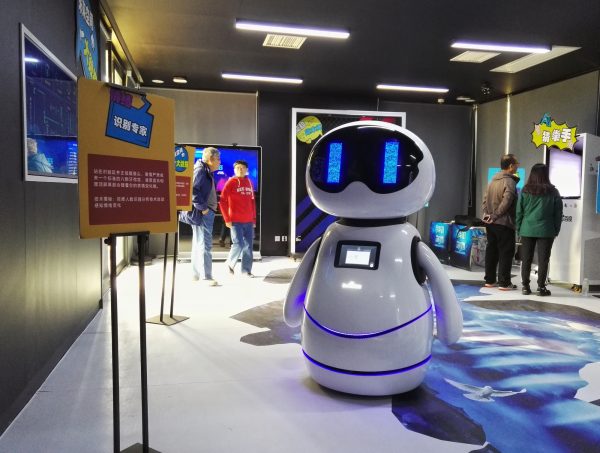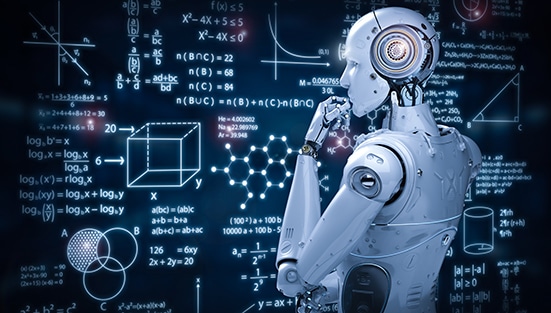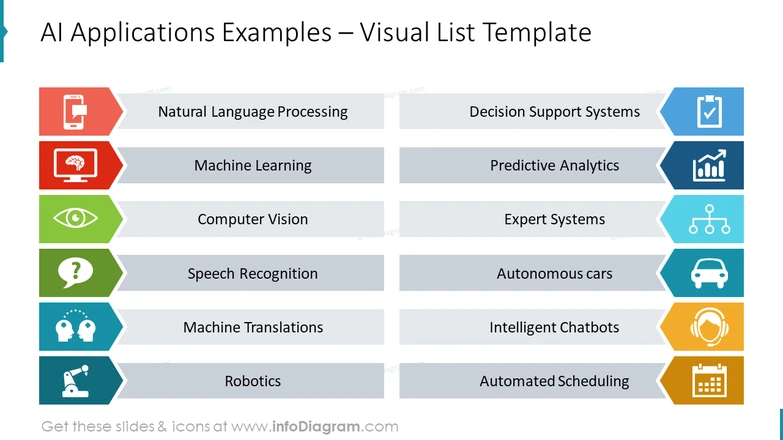Imagine a future where artificial intelligence seamlessly integrates into every facet of life, transforming industries and enhancing human capabilities. Baidu, a titan in the technological sphere, is at the forefront of this revolution, driving innovation and shaping the future of AI and technology. With groundbreaking advancements in AI-powered algorithms, open-source development, and real-world applications, Baidu is not just keeping pace with the digital age; it’s leading it. As we delve deeper into their contributions, it’s clear that Baidu is not only redefining technology but also paving the way for a smarter, more connected world.

AI-Powered Algorithms for Search
In the ever-evolving landscape of technology, Baidu stands as a beacon of innovation, particularly in the realm of AI-powered search algorithms. As the demand for more efficient and intuitive search experiences grows, Baidu is pioneering solutions that leverage artificial intelligence to redefine how we interact with information.

ERNIE’s Impact on Search Capabilities
At the heart of Baidu’s search capabilities is the ERNIE (Enhanced Representation through kNowledge Integration) model. ERNIE has revolutionized the way search engines understand and process queries. Unlike traditional search algorithms that rely heavily on keyword matching, ERNIE integrates deep learning and knowledge graphs to comprehend the context and intent behind users’ queries. This results in more relevant and precise search results, significantly enhancing user experience. By understanding the nuances of human language, ERNIE not only improves search accuracy but also allows for more natural interactions with AI systems, making information retrieval faster and more intuitive.
RocketQA: Best Possible Answers
Building on the foundation laid by ERNIE, Baidu introduced RocketQA, an advanced question-answering system designed to deliver the best possible answers to complex queries. RocketQA employs cutting-edge machine learning techniques to sift through vast amounts of data, identifying the most accurate and relevant responses. This system is particularly effective in scenarios where traditional search engines struggle, such as answering nuanced questions or providing in-depth explanations. By prioritizing quality over quantity, RocketQA transforms the search experience, offering users concise and reliable answers that enhance decision-making and knowledge acquisition.
Natural Language Processing Integration
Natural Language Processing (NLP) is a cornerstone of Baidu’s search algorithm advancements. By seamlessly integrating NLP into their systems, Baidu enables more sophisticated interaction between humans and machines. NLP allows Baidu’s search algorithms to interpret and respond to queries in a manner that mimics human understanding, taking into account context, sentiment, and language subtleties. This integration empowers users to communicate with search engines more naturally, using conversational language rather than rigid keywords. As a result, Baidu’s search capabilities become more accessible and user-friendly, breaking down barriers between technology and everyday users.
In summary, through innovations like ERNIE, RocketQA, and the integration of Natural Language Processing, Baidu is transforming the search landscape. These AI-powered algorithms not only enhance the accuracy and relevance of search results but also redefine the way we interact with technology, making it more intuitive and aligned with human communication. As Baidu continues to push the boundaries of AI in search, they are setting new standards for what is possible in the digital age.
Cutting-Edge AI Research at Baidu
Baidu’s commitment to advancing artificial intelligence goes beyond search algorithms, delving into groundbreaking research that pushes the boundaries of what AI can achieve. Their pioneering work in various AI domains is setting the stage for the next wave of technological innovation.

Natural Language Understanding & Generation Breakthroughs
Baidu’s research in Natural Language Understanding (NLU) and Generation (NLG) is paving the way for more sophisticated AI communication. By developing models that can not only comprehend language but also generate human-like text, Baidu is enabling machines to interact with users in more meaningful ways. These breakthroughs have significant implications for customer service, content creation, and language translation, where understanding context and generating coherent responses are paramount. Baidu’s advancements in this area are making it possible for AI to engage in more complex conversations, enhancing both user interaction and machine learning applications.
Computer Vision & Image Recognition Advancements
In the realm of computer vision, Baidu is making strides that are transforming how machines perceive and interpret visual information. Their research focuses on developing algorithms that can recognize and analyze images with unprecedented accuracy. These advancements in image recognition are being applied across various sectors, from autonomous vehicles that rely on precise object detection to healthcare systems that utilize imaging for diagnostics. By improving the ability of AI to understand and process visual data, Baidu is contributing to the development of smarter, more responsive technologies that can navigate and interpret the world around them.
Speech Recognition & Synthesis Innovations
Speech recognition and synthesis are key areas where Baidu is leading innovation. Their research aims to enhance the ability of AI systems to accurately recognize and generate human speech, making voice-activated interactions more seamless and efficient. By improving speech recognition, Baidu is enabling devices to understand and respond to voice commands with greater precision, an essential feature for smart home technologies and virtual assistants. Additionally, advancements in speech synthesis are allowing AI to produce more natural-sounding speech, bridging the gap between human and machine communication. These innovations are crucial for creating more engaging and accessible user experiences.
Through its cutting-edge research in natural language, computer vision, and speech technologies, Baidu is not only advancing AI capabilities but also shaping the future of how we interact with technology. By continuing to explore and innovate in these domains, Baidu is ensuring that AI remains at the forefront of technological progress, driving forward new possibilities for both businesses and consumers alike.
Open-Source AI Development Contributions
Baidu’s influence in the AI domain extends beyond proprietary technologies; their commitment to open-source AI development has empowered developers worldwide to participate in and contribute to cutting-edge technology. Through various open-source initiatives, Baidu is fostering a collaborative environment that accelerates innovation and democratizes access to advanced AI tools.

PaddlePaddle: Global Developer Empowerment
At the cornerstone of Baidu’s open-source contributions is PaddlePaddle, an advanced deep learning platform. PaddlePaddle is designed to be user-friendly and highly efficient, catering to both beginners and seasoned developers. It offers a comprehensive suite of tools that simplify the process of building, training, and deploying deep learning models. By providing open access to this platform, Baidu empowers developers globally to harness the power of AI, facilitating the creation of innovative solutions across industries. This empowerment is pivotal in driving global AI advancements, as it allows for a diverse pool of talent to contribute to and benefit from AI developments.
ERNIE: Knowledge-Enhanced Language Model
ERNIE, another significant contribution from Baidu, stands out as a knowledge-enhanced language model that is available to the global AI community. Unlike traditional models that focus solely on language patterns, ERNIE integrates structured knowledge, improving its ability to understand context and semantics. This enhancement makes ERNIE particularly adept at tasks such as text classification, sentiment analysis, and question answering. By open-sourcing ERNIE, Baidu provides researchers and developers with a powerful tool to enhance natural language processing applications, encouraging further exploration and innovation in language understanding technologies.
PaddleOCR: Accessible Optical Character Recognition
PaddleOCR is yet another testament to Baidu’s open-source initiative, offering a robust solution for Optical Character Recognition (OCR) tasks. This toolkit is designed to be easily accessible, providing developers with the tools needed to implement OCR solutions quickly and effectively. PaddleOCR supports multiple languages and is highly adaptable, making it suitable for a wide range of applications from document digitization to text extraction from images. By making PaddleOCR available to the open-source community, Baidu is enabling more accessible and widespread adoption of OCR technology, which can significantly boost productivity and efficiency in various sectors.
Through these open-source projects—PaddlePaddle, ERNIE, and PaddleOCR—Baidu is not only contributing valuable resources to the AI community but is also fostering a collaborative spirit that accelerates technological advancement. These initiatives highlight Baidu’s dedication to empowering developers and promoting widespread access to cutting-edge AI technologies, ensuring that the benefits of AI are shared across the globe.
Real-World AI Applications
Baidu’s advancements in AI are not confined to theoretical research or digital platforms; they are actively transforming various real-world sectors through innovative applications. By integrating AI into everyday technologies, Baidu is not only enhancing efficiency but also improving quality of life and business operations across the globe.

Autonomous Driving & Robotics Innovations
Baidu is at the forefront of autonomous driving technology, leveraging AI to develop sophisticated systems that enable vehicles to navigate safely and efficiently. Through its Apollo project, Baidu has created an open platform for autonomous driving, fostering collaboration and innovation in this rapidly growing field. Apollo equips vehicles with the ability to process complex data in real-time, allowing for accurate decision-making on the road. In addition to autonomous driving, Baidu is making strides in robotics, developing machines that can perform tasks ranging from simple household chores to complex industrial operations. These innovations are laying the groundwork for a future where autonomous technologies are seamlessly integrated into everyday life.
AI in Healthcare: Drug Discovery to Diagnosis
In healthcare, Baidu’s AI technologies are revolutionizing processes from drug discovery to patient diagnosis. By utilizing AI algorithms, Baidu is speeding up the drug discovery process, identifying potential compounds and predicting their efficacy with greater accuracy than traditional methods. Additionally, Baidu’s AI is enhancing diagnostic capabilities, allowing for earlier detection of diseases through advanced imaging and analysis tools. These applications not only increase the speed and accuracy of medical interventions but also have the potential to significantly improve patient outcomes. By applying AI to healthcare, Baidu is contributing to a more efficient and effective medical field.
Smart Cities & Business Intelligence Solutions
Baidu’s AI is also playing a crucial role in the development of smart cities and enhancing business intelligence. By integrating AI into urban infrastructure, Baidu is helping to create cities that are more efficient, sustainable, and responsive to the needs of their inhabitants. AI technologies are used to optimize traffic flow, manage energy consumption, and enhance public safety, among other applications. In the business realm, Baidu’s AI solutions provide powerful tools for data analysis and decision-making. These tools allow businesses to gain deeper insights into market trends, consumer behavior, and operational efficiencies, enabling more informed strategic planning.
Through these real-world applications, Baidu is demonstrating the transformative potential of AI across diverse sectors. By harnessing the power of AI, Baidu is not only driving technological innovation but also creating tangible benefits for society, from smarter cities to improved healthcare and beyond. As these technologies continue to evolve, Baidu remains a key player in shaping a future where AI enhances every aspect of our lives.
Baidu’s AI Vision & Future Technologies
As a leader in AI innovation, Baidu is not resting on its laurels. The company is looking ahead, focusing on cutting-edge technologies and ethical practices that will shape the future of AI. Baidu’s forward-thinking vision is centered on pioneering advancements and ensuring responsible AI development.

Quantum Computing Initiatives
Baidu is making significant strides in quantum computing, a field poised to revolutionize technological capabilities. By developing a superconducting quantum computer, Baidu is exploring new frontiers in computational power, aiming to solve complex problems that are currently beyond the reach of traditional computers. Quantum computing holds the potential to accelerate AI algorithms, optimize logistics, and enhance cybersecurity, among other applications. Baidu’s commitment to quantum computing initiatives highlights its dedication to staying at the forefront of technological innovation, working towards making these advancements widely accessible and applicable.
Multimodal AI & Cross-Lingual Understanding
In its pursuit of more versatile AI, Baidu is investing in multimodal AI and cross-lingual understanding. Multimodal AI refers to systems that can process and integrate multiple forms of data, such as text, audio, and images, to understand and interact with the world more comprehensively. By developing AI that can seamlessly transition between different modes of communication and understanding, Baidu is enhancing the adaptability and capability of AI systems. Additionally, cross-lingual understanding enables AI to operate across language barriers, promoting global connectivity and communication. These initiatives are vital for creating AI that is truly universal and inclusive.
Ethical AI Development & Responsible Innovation
Baidu recognizes the importance of ethical considerations in AI development. As AI technologies become more pervasive, ensuring responsible innovation is crucial. Baidu is committed to developing AI that adheres to ethical standards, prioritizing transparency, accountability, and fairness. This includes addressing biases in AI systems, safeguarding user privacy, and promoting sustainable practices. By embedding ethical principles into their AI vision, Baidu is not only advancing technological capabilities but also ensuring that these advancements benefit society as a whole.
Through its focus on quantum computing, multimodal AI, and ethical development, Baidu is charting a course for the future that balances innovation with responsibility. By leading the charge in these areas, Baidu is not only shaping the evolution of AI but also setting standards for how technology can be developed and applied ethically and effectively. As Baidu continues to drive forward its AI vision, it remains a pivotal force in defining the future of technology.